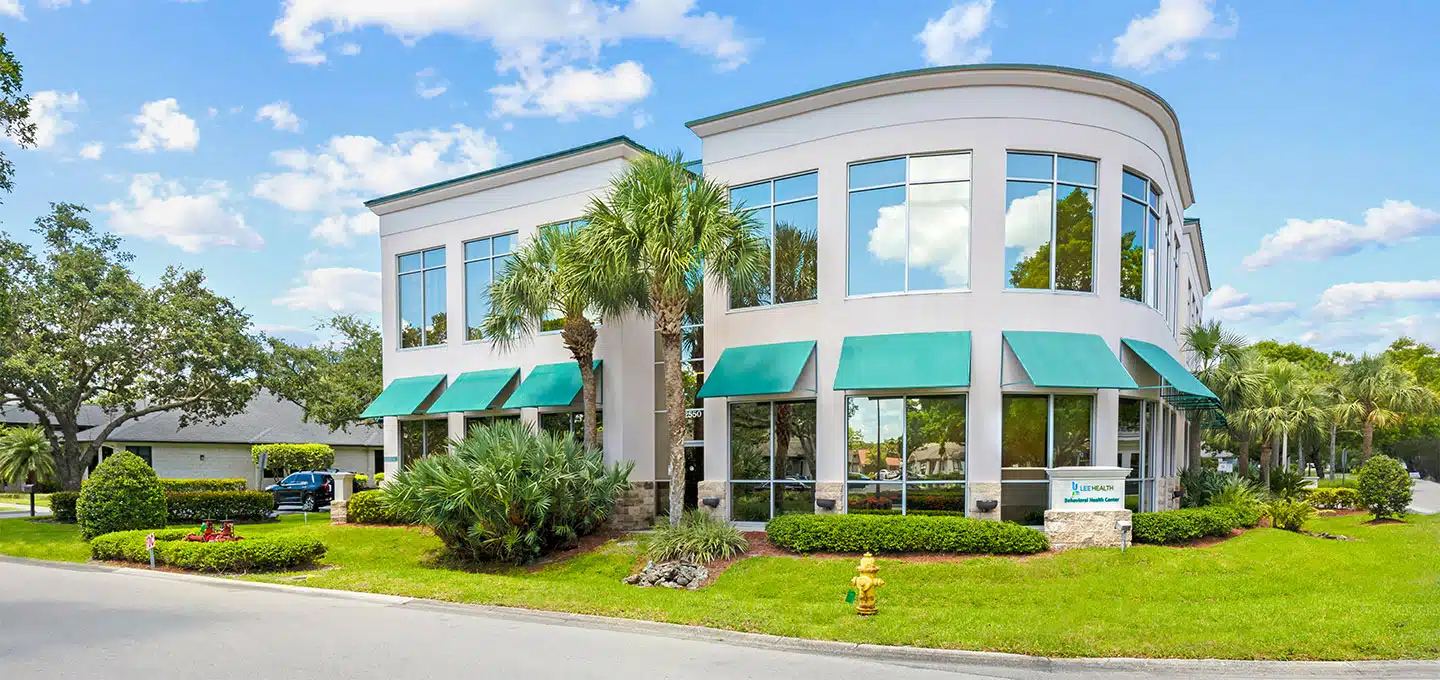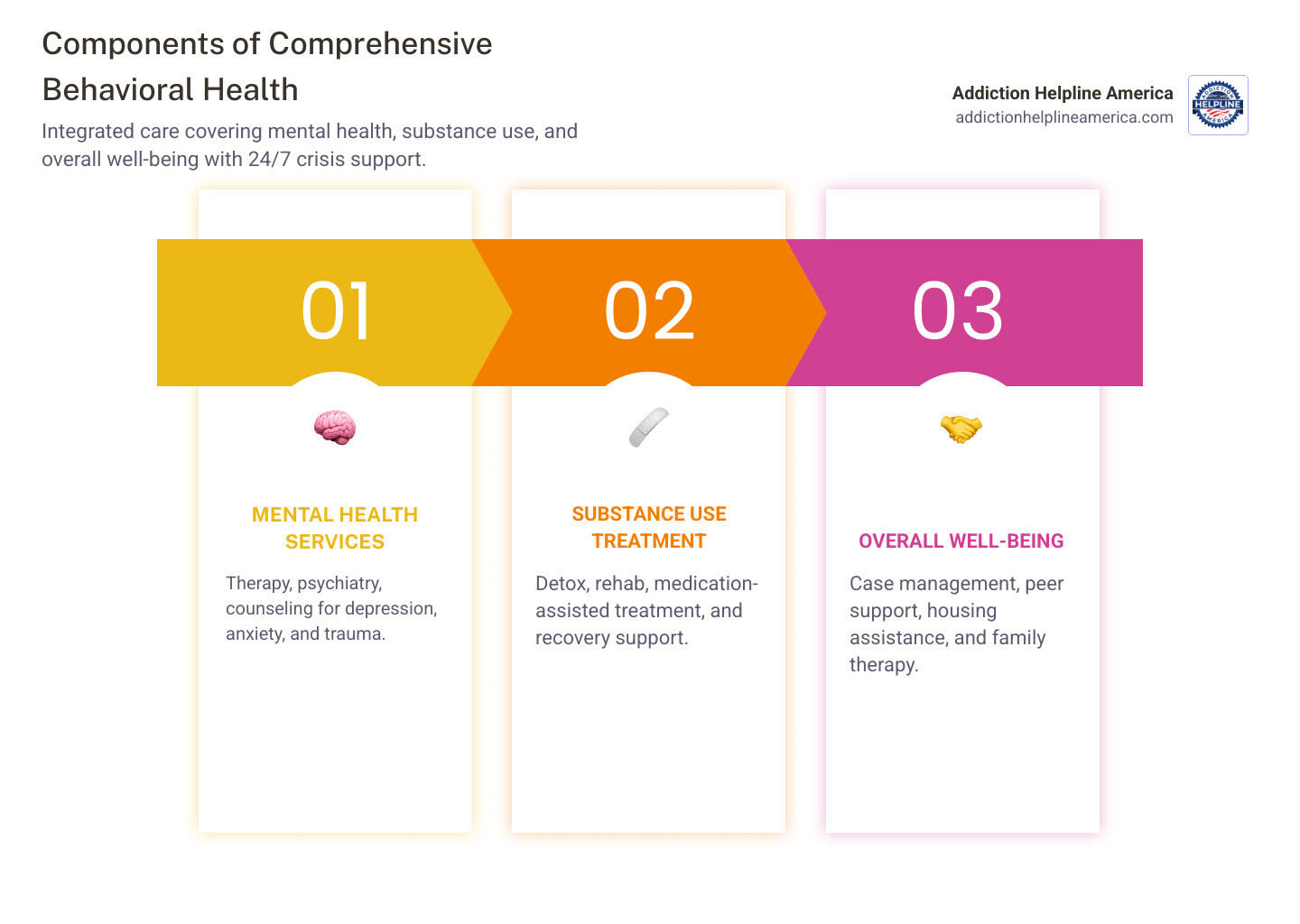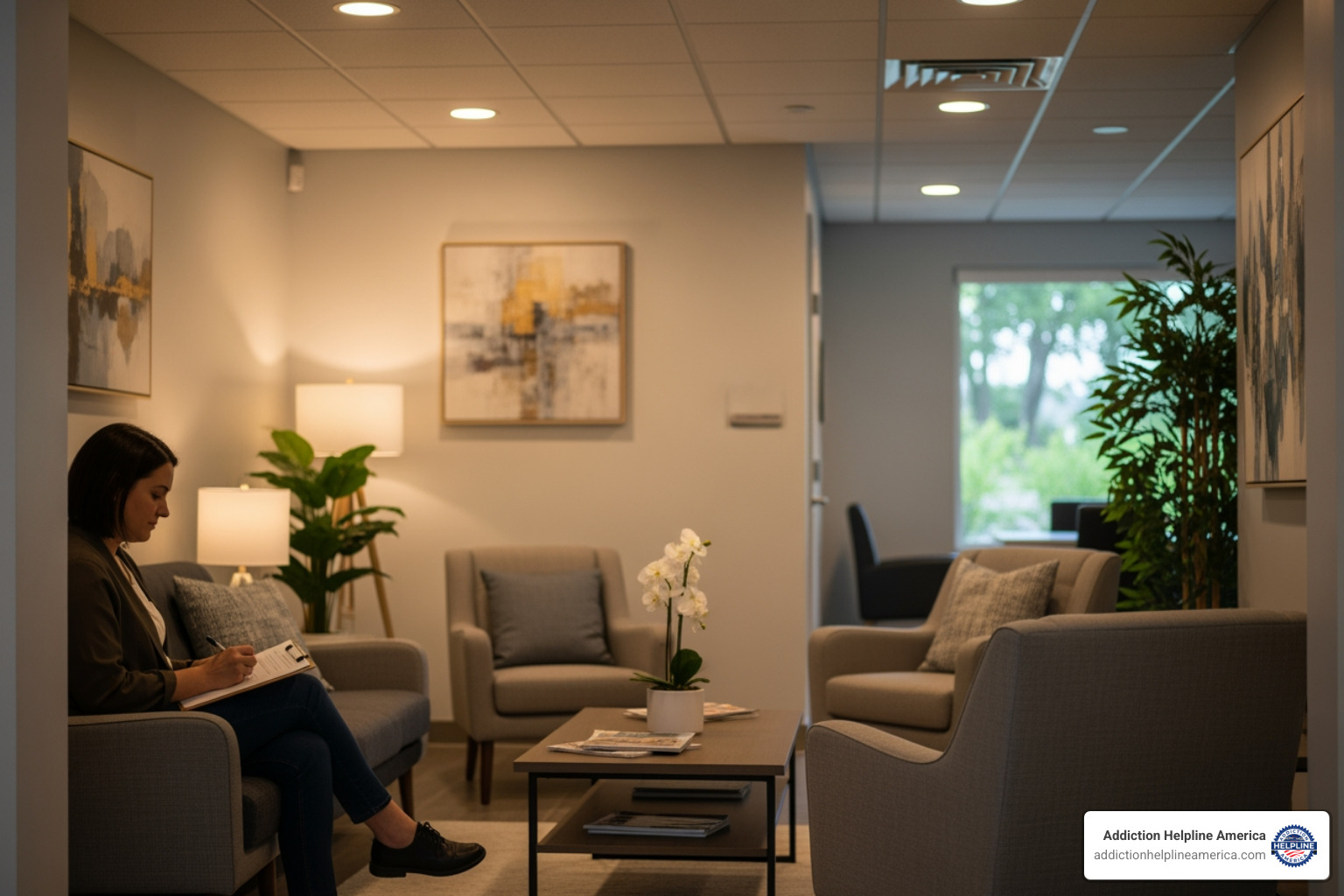
Why Finding Behavioral Health Near Me Matters
Searching for behavioral health near me is a critical step when you or a loved one is struggling. Whether facing depression, anxiety, or substance use, finding local, accessible care can be the difference between suffering in silence and starting the journey to recovery.
Quick Answer: What You Need to Know About Behavioral Health Near Me:
- Types of Services: Outpatient & inpatient therapy, IOP, PHP, crisis support, medication management, and substance use treatment.
- Who Can Help: Therapists, psychiatrists, counselors, case managers, and peer support specialists.
- How to Find Care: Use insurance directories, the SAMHSA locator, community health centers, or the 988 crisis line.
- Cost Options: Insurance, sliding scale fees, state/community programs, and payment plans.
- Emergency Help: Call or text 988 (Crisis Lifeline), call 1-800-662-HELP (SAMHSA’s Helpline), or dial 911 for emergencies.
Mental health challenges are common, affecting nearly 1 in 4 Americans annually. Furthermore, about half of those with substance use disorders also have co-occurring mental health conditions. The good news is that help is available and closer than you think. Behavioral health services encompass mental health care, substance use treatment, and crisis support. Finding local care allows for quick access to support and connection with community resources.
This guide covers recognizing the need for help, understanding treatment options, navigating insurance, and finding emergency support.
At Addiction Helpline America, we connect individuals and families with behavioral health near me resources through our 24/7 helpline. For over a decade, we’ve helped thousands find recovery by connecting them with quality local treatment programs and support services.

Behavioral health near me further reading:
Recognizing the Need: Common Signs and Conditions Treated
Knowing when to seek help isn’t always easy. However, recognizing the signs early and seeking professional support can make all the difference in how quickly you find relief. If you’re searching for behavioral health near me, you’re already taking an important step.

Signs It’s Time to Seek Help
Your mind and body send signals when something isn’t right. Watch for these changes in yourself or a loved one:
- Emotional Signs: Persistent sadness or hopelessness, increased irritability, constant worry or panic, and rapid mood swings.
- Behavioral Changes: Withdrawing from friends and family, losing interest in activities you once enjoyed, significant shifts in sleep patterns, or increased use of alcohol or drugs to cope.
- Cognitive Difficulties: Trouble concentrating or remembering things, feeling overwhelmed by simple decisions, or being stuck in a loop of negative thoughts.
- Physical Symptoms: Unexplained aches and pains, chronic fatigue, changes in appetite or weight, and digestive issues.
If you notice these signs, it’s not a weakness—it’s your system asking for support. For more information on recognizing signs of addiction specifically, you can visit our guide: More info about recognizing addiction.
Conditions Addressed by Behavioral Health Providers
Behavioral health providers treat a wide range of interconnected mental, physical, and behavioral challenges.
- Depression: More than just sadness, depression can drain your energy, rob you of pleasure, and interfere with daily life.
- Anxiety Disorders: These include generalized anxiety, panic disorder, and phobias, all characterized by excessive, uncontrollable worry and fear.
- Post-Traumatic Stress Disorder (PTSD): Develops after a traumatic event and can cause flashbacks, nightmares, and severe anxiety.
- Bipolar Disorder: Involves significant mood swings between emotional highs (mania) and lows (depression).
- Eating Disorders: Conditions like anorexia and bulimia involve serious disturbances in eating behaviors and require specialized treatment.
- Substance Use Disorders: Occur when alcohol or drug use leads to significant impairment or distress. Effective treatment is available, and recovery is possible.
- Co-occurring Disorders: This is when someone has both a mental health condition and a substance use disorder. The most effective treatment addresses both conditions together.
At Addiction Helpline America, our 24/7 helpline can connect you with local treatment programs for these and other conditions. We’ll help you find behavioral health near me options that fit your unique needs.
Exploring Your Options: Levels of Care and Specialized Programs
Finding the right behavioral health near me means understanding that treatment is a spectrum of options designed to meet you where you are. Whether you need intensive 24/7 support or flexible appointments, there’s a level of care that can help.

Understanding the Different Levels of Care
Behavioral health treatment is a continuum, with the goal of providing effective support in the least restrictive setting possible.
- Inpatient or Residential Treatment: Offers the highest level of care with 24/7 medical supervision in a live-in facility. It’s best for those in crisis, with severe conditions, or needing medical detox.
- Partial Hospitalization Programs (PHP): Provide intensive treatment during the day (often 5-7 hours), while you return home at night. It’s a step down from inpatient care.
- Intensive Outpatient Programs (IOP): Offer a flexible middle ground with therapy several times a week for a few hours each day, allowing you to maintain work or family responsibilities.
- Standard Outpatient Services: The most flexible option, involving scheduled appointments for therapy or medication management. It’s ideal for stable conditions or ongoing support.
For more detailed information about intensive options, our Inpatient Drug Rehab Programs Guide explores what to expect.
| Level of Care | Description | Intensity | Setting |
|---|---|---|---|
| Inpatient/Residential | 24-hour medical supervision, structured therapy, and support in a live-in facility. | Highest | Live-in facility, hospital-based |
| Partial Hospitalization (PHP) | Structured therapy and medical monitoring for several hours a day, multiple days a week; clients return home at night. | High | Day program at a facility |
| Intensive Outpatient (IOP) | Structured group and individual therapy for fewer hours than PHP, allowing clients to live at home and manage daily responsibilities. | Moderate | Outpatient clinic, community center |
| Standard Outpatient | Scheduled appointments for individual, group therapy, and medication management; clients live at home. | Low to Moderate | Private practice, outpatient clinic |
Finding Specialized Programs for Specific Needs
Many providers offer programs custom to specific populations and life circumstances.
- Adolescent Programs: Focus on the unique challenges facing teenagers, such as school pressure, peer relationships, and family dynamics.
- Young Adult Programs: Serve those in their late teens to mid-twenties, a time of transition to independence, and often include life skills training.
- Programs for Professionals: Offer discreet, flexible treatment options (like evening sessions) for individuals in demanding careers.
- Women-Focused Care: Addresses issues that disproportionately affect women, such as perinatal mental health and trauma, in a safe, supportive space.
- LGBTQ+ Affirming Treatment: Provides inclusive, understanding care that recognizes the specific stressors faced by LGBTQ+ individuals.
- Family Support Programs: Involve family members in therapy and education, recognizing that behavioral health issues affect the entire family.
At Addiction Helpline America, we help you steer these options to find the right fit. We’re here to guide you toward the treatment that will work best for you.
Call Now – Your Journey to Recovery Begins Today!

Take the first step towards a healthier life! Call now to connect with our compassionate team and start your recovery journey today. Your path to healing awaits!
Our recovery specialists are available 24/7 to provide support, and all calls are confidential and free. Reach out anytime – we’re here to help!
Your Guide to Finding Behavioral Health Near Me
Navigating behavioral health services can feel overwhelming, but help is closer than you think. Whether you have insurance or not, there are pathways to the support you need. Let’s walk through how to find the right behavioral health near me services.

How to find a behavioral health provider that accepts my insurance
If you have insurance, it’s your best resource for finding affordable care. Here’s how to start:
- Use Your Insurer’s Online Directory: Most insurance companies maintain searchable databases of in-network mental health providers. Log in to your member portal on their website to find the most accurate information for your plan.
- Call Your Insurance Provider: Use the customer service number on your insurance card. Ask about your specific behavioral health benefits, including copays, deductibles, and any need for pre-authorization.
- Understand In-Network vs. Out-of-Network: In-network providers have negotiated rates with your insurer, meaning significantly lower costs for you. Out-of-network care will be much more expensive.
- Verify with the Provider’s Office: Once you find a potential provider, call their office directly to confirm they accept your specific plan and are taking new patients. This step can prevent surprise bills and frustration.
Medicaid, Medicare, and most private health insurance plans include coverage for behavioral health services—you just need to know how to access them.
How to find behavioral health near me without insurance
Not having insurance doesn’t mean you’re out of options. A network of resources exists to help uninsured or underinsured individuals access quality care.
- Community Behavioral Health Centers (CBHCs): These centers receive state or county funding to provide services to everyone, regardless of ability to pay. Many operate on a sliding scale based on income, and some services may be free. Search online for the CBHC or Local Mental Health Authority (LMHA) serving your county.
- Sliding Scale Fees: Many private therapists and clinics offer fees that adjust to what you can afford. Don’t hesitate to ask about this option when you call.
- SAMHSA National Helpline: Call 1-800-662-HELP (4357) anytime for a free, confidential conversation. Trained specialists can provide treatment referrals and information in English and Spanish. You can also use their anonymous treatment locator at FindTreatment.gov. For more information, visit the SAMHSA National Helpline page.
- No-Cost Treatment Options: If you’re dealing with addiction, our Free Addiction Treatment options guide can help you find programs that provide care regardless of your financial situation.
The Growing Role of Telehealth in Behavioral Health
Telehealth has revolutionized access to behavioral health near me services. Virtual care removes many common obstacles, like travel time, childcare needs, and geographic distance.
For people in rural areas or those with mobility challenges, telehealth is often the only way to connect with specialized providers. It offers expert care from the comfort and privacy of your own home, which can help you feel more at ease discussing difficult topics. Many providers now offer virtual options for individual therapy, group sessions, and medication management, ensuring you can get support in a way that fits your life. Our Behavioral Health Services directory can help you explore providers offering various modalities, including virtual care.
What to Expect: Your First Appointment and Paying for Care
Taking the first step toward behavioral health near me support is a major accomplishment. Knowing what to expect can ease the stress of that first appointment and concerns about cost, so you can focus on healing.

Preparing for Your Initial Assessment
Your first appointment is a conversation for your provider to understand your situation and for you to learn how they can help. The goal is to create a personalized treatment plan.
Before you go, gather some information:
- A list of your current symptoms and how long you’ve had them.
- A list of all medications you’re taking, including dosages.
- Information about any past mental health or substance use treatment.
- Any questions you have for the provider.
During the assessment, your provider will ask about your current concerns, family history, and goals for treatment. This is also your chance to interview them. Ask about their experience, treatment approach, and what a typical session looks like to ensure it’s a good fit.
Understanding the Costs of Treatment
Treatment is more accessible than many people think, and there are multiple ways to manage the cost. Costs vary based on the type and duration of care, your location, and the provider’s credentials.
If you have insurance, you’ll need to know your deductible (what you pay before insurance kicks in) and your copay (a fixed amount per visit). Most insurance plans, including Medicaid, Medicare, and private policies, cover behavioral health services.
Call Now – Your Journey to Recovery Begins Today!

Take the first step towards a healthier life! Call now to connect with our compassionate team and start your recovery journey today. Your path to healing awaits!
Our recovery specialists are available 24/7 to provide support, and all calls are confidential and free. Reach out anytime – we’re here to help!
If you don’t have insurance, you still have options. Many providers accept private pay and may offer a payment plan. Community health centers often use sliding scale fees based on your income to make care affordable.
Under the No Surprises Act, a federal law, you have the right to a good faith estimate of costs before you receive care. Be sure to ask your provider about this upfront.
We also maintain a directory of Affordable Treatment Program options to help you find programs that match your budget. At Addiction Helpline America, our team can help you steer insurance questions and find providers who offer financial flexibility.
Immediate Help and Supporting a Loved One
In a crisis, you don’t have to face it alone. Whether you’re in immediate distress or watching a loved one struggle, knowing where to turn can make all the difference.

How to Access Emergency Behavioral Health Services
When a mental health or substance use crisis hits, immediate, 24/7 support is available. Don’t wait to get help.
- 988 Suicide & Crisis Lifeline: For any mental health emergency, call or text 988. This free, confidential service connects you with trained crisis counselors for immediate support and local referrals. Visit the official 988 Lifeline website to learn more.
- SAMHSA’s National Helpline: Call 1-800-662-HELP (4357) for 24/7 treatment information and referrals for mental health or substance use concerns.
- Disaster Distress Helpline: For emotional distress following a disaster, call 1-800-985-5990 for specialized crisis counseling.
- 911 and Emergency Rooms: For any life-threatening situation where someone is at immediate risk of harming themselves or others, call 911 or go to the nearest emergency room.
Many communities also offer mobile crisis units that can provide on-site assessment. Reaching out for help during a crisis is a sign of strength. State-specific resources, like Louisiana Addiction Hotlines, can also provide targeted support.
How to Support Someone Who is Struggling
Watching a loved one struggle is difficult. Your compassion and presence matter more than having the perfect words.
- Listen Without Judgment: Create a safe space for them to share. Put your phone away, make eye contact, and resist the urge to offer immediate solutions. Simply saying, “I’m here for you,” can be powerful.
- Gently Encourage Professional Help: You might say, “I’ve noticed you’ve been struggling, and I wonder if talking to someone might help.” Offer to assist them in their search for behavioral health near me providers or drive them to an appointment.
- Offer Practical Support: Small gestures go a long way. Offer to help with meals, chores, or childcare to relieve some of their daily pressure.
- Educate Yourself: Learning about their condition helps you respond with more patience and understanding.
- Set Healthy Boundaries: Supporting someone doesn’t mean sacrificing your own well-being. It’s okay to protect your own mental health so you can continue to be a source of support.
At Addiction Helpline America, we understand that families need support, too. Our helpline guides families through the process of helping their loved ones find care. Call us anytime for compassionate guidance.
Conclusion
You’ve made it through this guide, which shows your commitment to finding help. Whether for yourself or a loved one, searching for behavioral health near me is the start of a path toward healing.
This guide has covered how to recognize the need for help, explore different levels of care, steer insurance and costs, and find emergency support. We’ve shown you practical ways to find providers, access care with or without insurance, and leverage telehealth for greater accessibility.
Taking the first step is often the hardest part. It takes courage to admit you need help and to make that first call. But that single step can change everything. Recovery isn’t just possible—it happens every day for people who decided they deserved a better life.
Call Now – Your Journey to Recovery Begins Today!

Take the first step towards a healthier life! Call now to connect with our compassionate team and start your recovery journey today. Your path to healing awaits!
Our recovery specialists are available 24/7 to provide support, and all calls are confidential and free. Reach out anytime – we’re here to help!
You don’t have to figure this out alone. At Addiction Helpline America, we’ve spent over a decade connecting people just like you with the right treatment programs. Our team is available 24/7 to provide free, confidential guidance custom to your specific needs. We’re here to help you find behavioral health near me resources that truly fit your situation.
Hope is a real outcome we see time and again. Recovery is within reach, and the right support can make all the difference. Let us help you take that crucial first step today. Find the right treatment program for you.
Our helpline is 100%
free & confidential
If you or someone you care about is struggling with drug or alcohol addiction, we can help you explore your recovery options. Don’t face this challenge alone—seek support from us.
Programs
Resources
Will my insurance
cover addiction
treatment?
We're ready to help
Find the best
drug or alcohol treatment
center
Are you or a loved one struggling with addiction? Call today to speak to a treatment expert.





